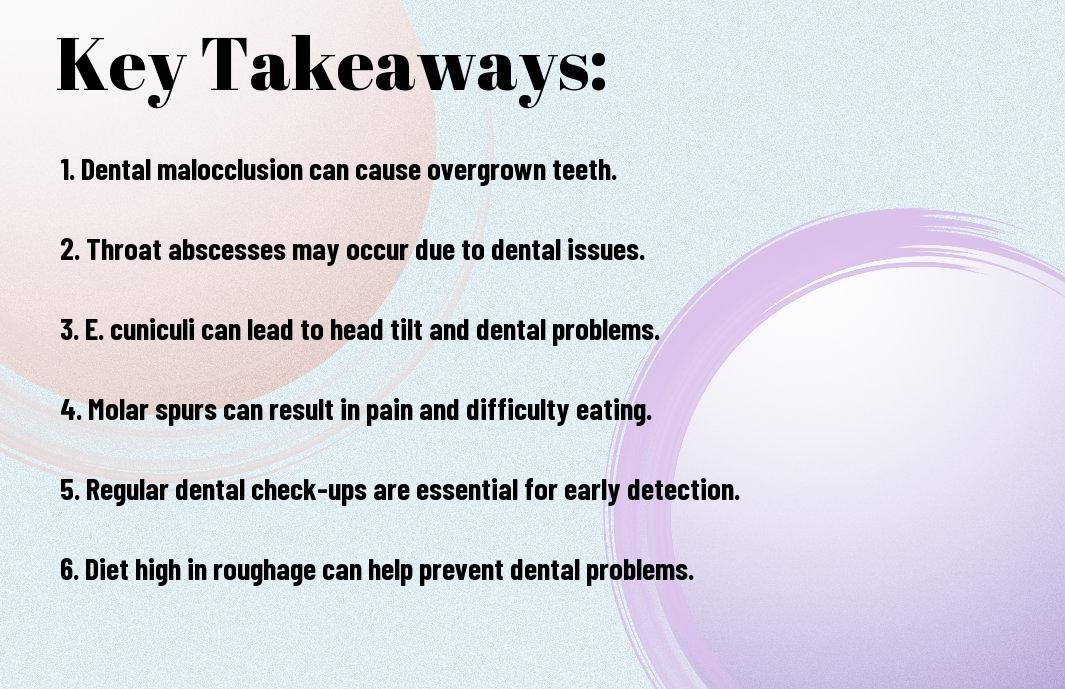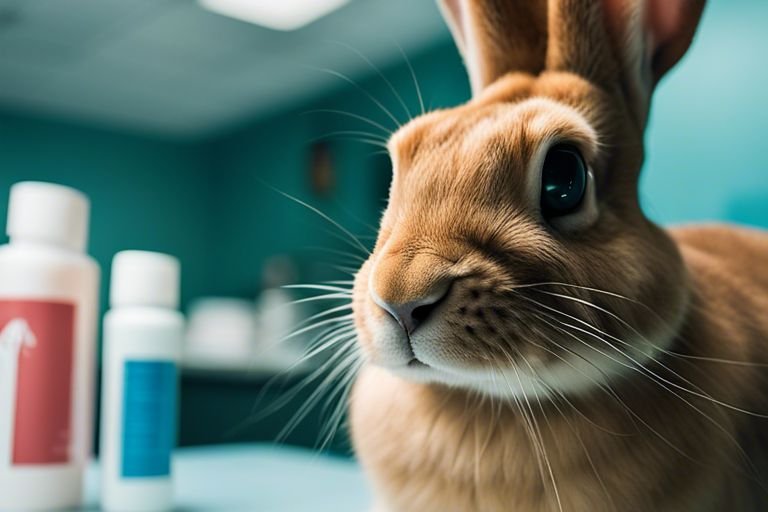Are you aware of the critical nature of throat dental problems in Flemish Giant rabbits? These gentle giants are prone to a number of dental issues that can severely impact their health and well-being. In this post, we will explore the most common throat dental problems in Flemish Giant rabbits, including their causes, symptoms, and important treatment options. By understanding these issues, you can proactively ensure the optimal dental health of your beloved pet.
Key Takeaways:
- Malocclusion: Flemish Giant rabbits are prone to dental malocclusion, which can lead to overgrown teeth and difficulty eating.
- Tooth spurs: Misaligned teeth can result in sharp points, or spurs, that can cause pain and mouth ulcers in Flemish Giant rabbits.
- Periodontal disease: Build-up of food and bacteria can lead to periodontal disease, causing inflammation and infection in the gums of Flemish Giant rabbits.
- Root elongation: Overgrown teeth in Flemish Giant rabbits can lead to elongation of the roots, which may cause sinus infections and other serious health issues.
- Regular dental checks: It is crucial for Flemish Giant rabbit owners to schedule regular dental check-ups to prevent and address common dental problems in their pets.


Understanding Flemish Giant Rabbits
The Flemish Giant rabbit is known for its impressive size, often weighing between 14 to 22 pounds. They are one of the largest domestic rabbit breeds and are characterized by their gentle and docile nature. Originally bred for meat and fur, these rabbits are now popular as companion animals due to their friendly temperament and relaxed disposition.
Size and Strength Considerations
The Flemish Giant rabbit is an impressively large and strong breed. When caring for a Flemish Giant, it’s important to understand that their size and strength can present unique challenges. They require a spacious living environment and should be handled with care due to their powerful nature. You should also be mindful of their large appetite and ensure they receive an appropriate diet to support their size and growth. Despite their formidable appearance, Flemish Giants are known for their gentle, friendly demeanor when properly socialized and cared for.
Temperament and Social Behavior
Flemish Giant rabbits are known for their gentle and sociable nature. They are often described as calm, docile, and affectionate, making them ideal companions for individuals and families alike. However, it’s important to remember that each rabbit has its own unique personality, so it’s essential to spend time getting to know your rabbit and understanding its individual needs and preferences. With proper handling and socialization, you can form a strong bond with your Flemish Giant, enjoying their loving and gentle companionship for years to come.
Dental Anatomy and Potential Issues
As with all rabbits, the dental health of Flemish Giants is a crucial aspect of their overall well-being. These rabbits have a unique dental anatomy, with continuously growing teeth that require proper wear and maintenance. Failure to address dental issues can lead to serious health complications, including malocclusion, abscesses, and difficulty eating. It’s essential to provide your Flemish Giant with ample opportunities to chew on grass hay, chew toys, and other safe materials to support their dental health. Regular veterinary check-ups and monitoring of your rabbit’s eating habits can help identify and address any potential dental issues before they become more serious concerns.
Common Dental Problems in Flemish Giants
Lastly, it’s important to be aware of the common dental problems that Flemish Giant rabbits are prone to. These issues can have a significant impact on your rabbit’s overall health and wellbeing. Understanding these problems and their implications can help you take proactive steps to prevent and address them. For more detailed information on dental disease in rabbits, you can visit Dental Disease in Rabbits.
Malocclusion and Its Implications
One of the most prevalent dental issues in Flemish Giants is malocclusion, a condition where the teeth don’t align properly, leading to overgrowth and sharp points. This can result in difficulty eating, drooling, and even injury to the mouth. If left untreated, malocclusion can lead to abscesses and other serious health concerns. Regular dental check-ups with a veterinarian experienced in rabbit dentistry are essential to catch and address malocclusion early.
Dental Abscesses: Causes and Treatments
Flemish Giants are also prone to developing dental abscesses, which are pockets of pus that form near the teeth as a result of infection. These abscesses can be extremely painful for your rabbit and may lead to loss of appetite and overall decline in health. Prompt diagnosis and treatment by a knowledgeable veterinarian are crucial to prevent the spread of infection and alleviate your rabbit’s discomfort. In some cases, surgical intervention may be necessary to remove the abscess and prevent recurrence.
Teeth Barbing and Dental Injuries
Teeth barbing and other dental injuries can occur in Flemish Giants, particularly if their teeth become overgrown or misaligned. This can lead to painful sores in the mouth and difficulty eating. Regular monitoring of your rabbit’s dental health and providing appropriate chew toys and a balanced diet can help minimize the risk of these issues. If you notice any signs of dental discomfort in your rabbit, such as drooling or reluctance to eat, it’s essential to seek veterinary care promptly to address the problem before it worsens.
By staying informed about these common dental problems in Flemish Giant rabbits and taking proactive measures to monitor and care for your rabbit’s dental health, you can help ensure a long and happy life for your beloved pet.
Prevention and Care Strategies
After learning about the common dental problems in Flemish Giant rabbits, it’s vital to understand the prevention and care strategies to ensure your pet’s oral health is maintained. By taking proactive measures, you can minimize the risk of dental issues and provide the best care for your rabbit.
Importance of Regular Check-Ups and Dental Care
Regular check-ups with a veterinarian specializing in exotic animals are crucial for your Flemish Giant rabbit’s oral health. Your vet can perform dental exams to identify any potential issues and provide treatments if needed. Additionally, you should consider professional dental cleanings to prevent tartar buildup and maintain healthy teeth and gums.
Nutritional Considerations for Oral Health
The diet plays a significant role in your rabbit’s dental health. Ensure your rabbit has access to a diet rich in high-quality hay, fresh vegetables, and limited fruit. This type of diet encourages proper chewing and helps wear down the rabbit’s teeth naturally. Avoid feeding your rabbit excessive amounts of pellets or treats, as these can contribute to dental problems.
Grooming and Oral Hygiene Practices
Regular grooming and oral hygiene practices are essential for preventing dental issues in Flemish Giant rabbits. You should regularly check your rabbit’s teeth and gums for any signs of abnormalities. Additionally, providing safe chew toys can help maintain dental health by promoting natural chewing behavior and preventing overgrowth of teeth.
Advanced Care and Veterinary Services
Your Flemish Giant rabbit’s dental health is an important aspect of their overall well-being. It is essential to provide regular veterinary care and advanced dental services to maintain their oral health. Here are some key aspects of advanced care and veterinary services for your rabbit’s dental needs:
- Regular Veterinary Check-ups: Ensure you schedule regular check-ups with a rabbit-savvy veterinarian to monitor your rabbit’s dental health and address any potential issues.
- Specialized Dental Services: Seek out a veterinarian experienced in rabbit dentistry who can provide specialized dental care, including regular dental exams, tooth trimming, and treatment for dental problems.
Surgical Interventions and Dentistry
When it comes to advanced dental care for your Flemish Giant rabbit, surgical interventions may be necessary in cases of severe dental problems. The most common surgical procedures include tooth extractions, abscess removals, and corrective dental surgery to address dental malocclusion. A skilled veterinarian with experience in rabbit dentistry can perform these procedures effectively to ensure your rabbit’s dental health is restored.
Emergency Care and Critical Dental Issues
In some cases, your rabbit may experience critical dental issues that require immediate attention. These can include dental abscesses, severe malocclusion, or injuries to the teeth or jaw. It is crucial to seek emergency veterinary care if you notice any signs of distress or pain related to your rabbit’s dental health. Quick intervention can prevent further complications and alleviate your rabbit’s discomfort.
The Role of Pet Insurance in Managing Health Costs
As a responsible pet owner, you understand the importance of providing the best possible care for your Flemish Giant rabbit, including their dental health. Pet insurance can play a valuable role in managing the costs of advanced veterinary services and emergency care for your rabbit. By investing in a comprehensive pet insurance plan, you can ensure that your rabbit receives the necessary dental treatments without financial strain. Consider exploring pet insurance options to safeguard your rabbit’s health and well-being.
Conclusion
With this in mind, it’s important to keep an eye out for common throat dental problems in your Flemish Giant rabbit. Regular dental check-ups and a proper diet are crucial in preventing issues such as sharp points on the teeth, overgrown incisors, or molar spurs. Additionally, being aware of the signs of dental problems and seeking prompt veterinary care can help to mitigate any potential issues before they become serious. By staying informed and proactive, you can help ensure the health and well-being of your rabbit.
FAQ
Q: What are the common throat dental problems in Flemish Giant Rabbits?
A: The most common throat dental problems in Flemish Giant Rabbits are malocclusion, elongated roots, and abscesses. Malocclusion occurs when the teeth do not properly align, leading to overgrowth and sharp points that can cause injuries to the mouth and throat. Elongated roots can also cause issues as they grow into the jawbone. Additionally, abscesses can develop from bacterial infections due to tooth problems.
Q: What are the symptoms of throat dental problems in Flemish Giant Rabbits?
A: Symptoms of throat dental problems in Flemish Giant Rabbits may include excessive drooling, difficulty eating or swallowing, weight loss, bad breath, and pawing at the mouth. In severe cases, there may be visible swelling or discharge around the throat area. It’s important to monitor your rabbit for any changes in behavior or eating habits, as these can be indicative of dental issues.
Q: How can throat dental problems in Flemish Giant Rabbits be prevented and treated?
A: Preventative measures for throat dental problems in Flemish Giant Rabbits include providing a diet high in fiber and roughage to promote natural wear of teeth, as well as regular veterinary check-ups to monitor dental health. Treatment often involves filing down overgrown teeth, removing elongated roots, and managing any existing abscesses through dental procedures and antibiotics. In severe cases, surgical interventions may be necessary to correct dental issues.
